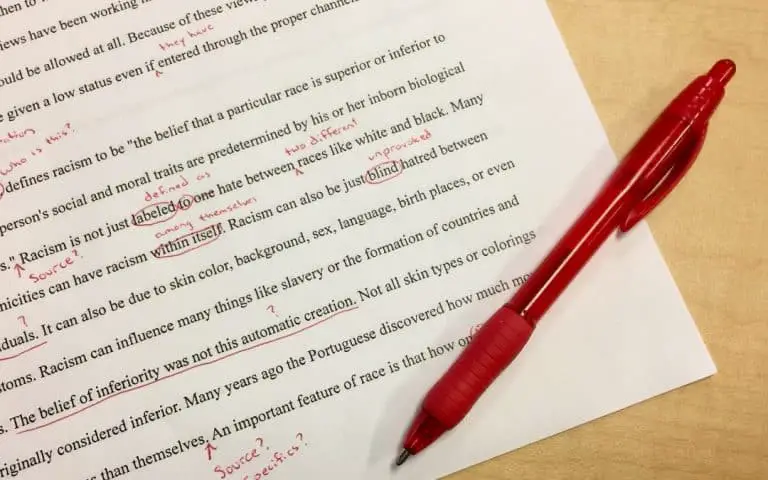In the FCE Listening paper candidates have to listen to four different parts and they have to do something different in every task. However, there is one thing that often creates a lot of problems – distractors. Here’s what they are:
A distractor is a piece of information put in a recording in the FCE exam in order to confuse you. It is usually designed to make you choose the wrong answer by talking about all the options without being 100% correct. The two most common distractors are contrasting linking expressions (but, however, although, despite, etc.) as well as negative expressions (not, don’t/doesn’t, never, etc.).
If you want to find out how to deal with this kind of problem, just keep reading!
What does a Distractor Look Like
Distractors cost many candidates valuable marks and are, therefore, really annoying. They can come in different shapes and forms, but generally speaking, it always works the same way.
You will find yourself in a lot of situations in the exam where you are listening to one part of the recording and you are completely confused because you’ve just heard the people in the recording talking about all the possible answers. Now you are unsure of which one to choose.
Welcome to FCE! The people at Cambridge English design the listening recording in order to confuse you as much as possible, but let’s have a look at an example from Listening Part 1 so you can see distractors in action.
Question:
You hear a young man talking about his hobby of rock climbing.
How does he feel about it?
A satisfied with his level of expertise
B concerned about doing a dangerous sport
C proud when he copes with difficult conditions
Transcript of the recording:
It’s not for everyone, but I love the physical aspect. I started almost
by accident – my uncle took me to an indoor climbing wall and I was hooked. The start of any climb still gives me a real buzz. I’ve never
settled for being less than the best at anything I’ve tried, and that’s
what pushed me to the standard I am now – which doesn’t mean
I don’t think I can still improve! (A) I get a huge sense of achievement
when I finish a particularly demanding climb (C), and though other
climbers get nervous sometimes, like when there’s ice, or the
weather’s bad, that never puts me off (B).Source: Cambridge English First Handbook for Teachers from 2016
You can see the underlined parts which all talk about one of the possible answers A, B or C. The problem is that only one of them can be correct. In this case, C is the right choice. In A, the young man says that he has reached a high level, but still wants to get better (“…which doesn’t mean
I don’t think I can still improve!”), which means that he is not satisfied as answer A suggests. In B, he talks about other climbers (“…and though other
climbers get nervous sometimes,…”) and that dangerous situations don’t affect him (“…that never puts me off.”).
There you have it. In the recording all three possible answers are mentioned, but the wrong ones are usually contradicted in some way, for example by using linking expressions of contrast (“and though other climbers get nervous…”) or by simply adding another piece of information that makes the option incorrect (“…which doesn’t mean I don’t think I can still improve!”
How Can You Deal with Distractors?
Your goal, of course, should be not to get distracted during the listening exam and there are a couple of useful strategies to help you with that.
The best way to avoid being distracted is to ignore the distractions. What I mean with that is that you can only get confused if you let the conflicting information become a problem. So, the easiest option to stay on task is to ignore the possible answers (A, B or C) before you start listening. Only focus on the questions and try to answer them by yourself while you’re listening for the first time. Then, compare your own answer to the three possibilities. If there is one that matches your thoughts, it is probably the correct answer. To confirm, listen for the second time and you can still change your mind if you see that you were wrong.

My second tip for you is to be prepared before you start listening. Read the questions very carefully (you get some time for this in the exam) and underline the most important information. This way, you know exactly what you will have to listen for and the chances to get distracted become smaller and smaller.
And last but not least, make sure that you are prepared for the exam. Study the different exam tasks so you know exactly what to do. In a stressful situation like the FCE exam you need any help you can get and preparation is by far the best thing for you and your chances to pass.
More Examples
In this part I’m going to show you an example of a Listening Part 4 exam task. You can listen to the audio and see if you are able to answer the questions. Below the audio I will also post the full transcript of the recording plus the correct answers so you can check where the distractors are and learn from your mistakes.
Try to use the strategies above and see if you get distracted less.
Task:
You will hear Leonie Steiner talking to an interviewer about her work as a music teacher in a school. For questions 1-7, choose the best answer (A, B or C).
| 1. Leonie first started learning the piano A with a relative. B at primary school. C with a private teacher. | 5. Leonie thinks the problem with singing in schools is that A many students are too embarrassed to sing. B few students want to learn how to sing. C singing is not often taught in them nowadays. |
| 2. Leonie started giving music lessons A for the pleasure of seeing others learn. B because she needed some extra money. C to see if she was suited to teaching. | 6. Leonie believes her success as a music teacher is a result of A choosing a particular age group of children to teach. B the training she received as a student teacher. C a natural ability to communicate with young people. |
| 3. Leonie most likes to teach students who A have great natural talent at an early age. B need good teaching to develop their talent. C have previously been taught badly. | 7. What decision did Leonie find difficult to make? A to turn down the offer of a job abroad B to refuse promotion in the school C to continue teaching when she felt tired |
| 4. Leonie thinks that schools should A employ far more music teachers. B buy good musical instruments. C ensure that all their pupils pass music exams. | Source: Cambridge English First Trainer 2nd Edition (2015). |
Source: Cambridge English First Trainer 2nd Edition (2015)
Transcript:

Correct answers: 1C, 2A, 3B, 4B, 5A, 6C, 7B
Other problems in the FCE listening exam
While distractors are definitely the biggest problem for many students, there are a few more issues. Luckily, there is a very simple way to deal with them so continue reading to find out how.
In the listening paper of Cambridge B2 First you hear a lot of different people talking in a wide range of situations such as monologues, conversations, interviews, presentations, etc. One of the results of this variety of speakers is that you have to listen to many different accents of the English language. You will hear American, Irish, Scottish, British, Australian, South African and many more. This can become quite difficult and confusing as you might not be familiar with all of them so a thick Irish accent could possible sound like a completely different language.
Another problem is the speed at which these people speak. In your preparation classes you probably have a teacher who speaks slowly and clearly so you can understand everything easily and when you talk with your classmates you also try to be as clear as possible. However, in the exam the speakers have a more natural speed and you might get lost very quickly.
The good news is that you can solve this problem with just a little bit of work every day. My tip for you: Listen to something in English every day for just a few minutes. This way your ears and brain get used to the English language. Your understanding will improve within a few weeks and you will feel much more relaxed during your practice in class, at home and in the exam.
Conclusion
Distractors (and other problems) can make the listening exam very difficult for you, but, fortunately, these issues can be solved very easily with some practice and a little bit of technique.
I hope this article has helped you and please leave a comment if you want to give some feedback.
Lots of love,
Teacher Phill 🙂







